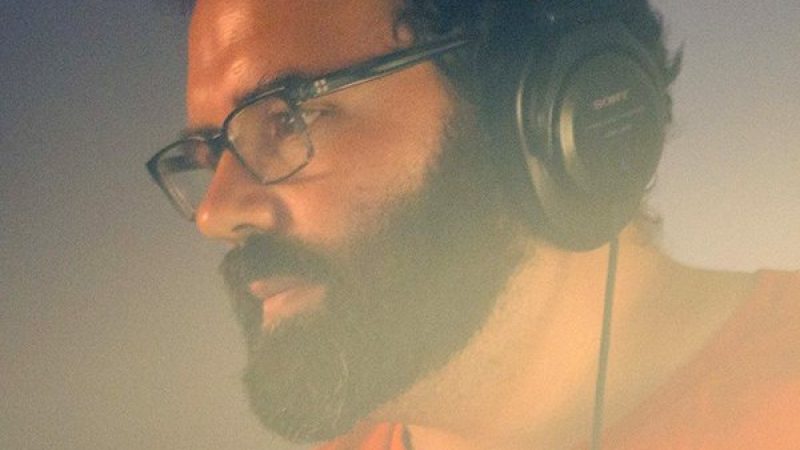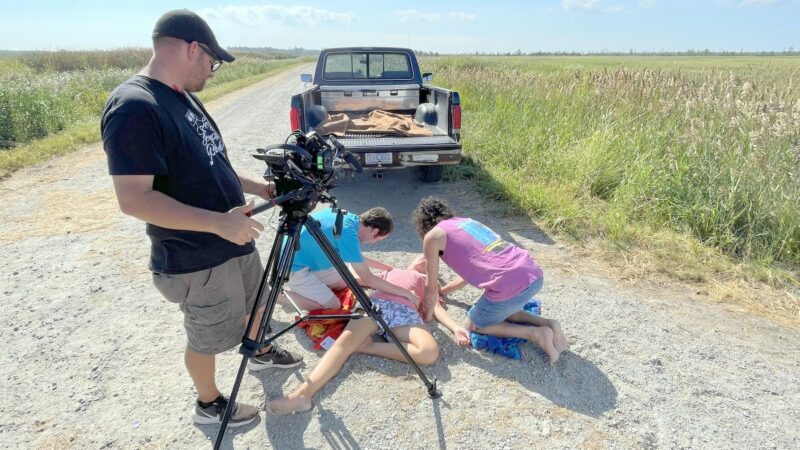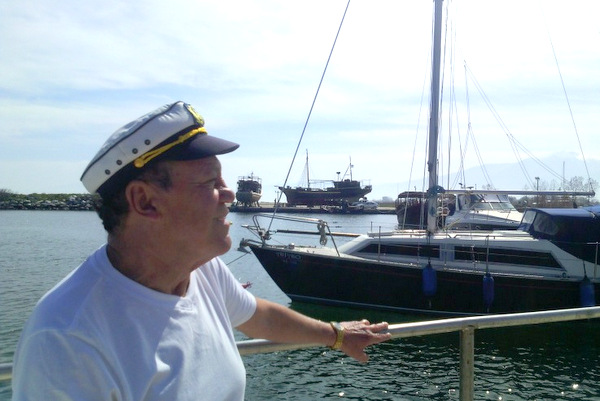
In a candid interview with Film Author Bruno Pischiutta, Olga Matsyna unveils the many facets of a career that spans five decades. I spent the last six months researching and reading about Bruno Pischiutta to the full extend of what was available online.
His body of work is impressive. When he was only 19 years of age he received the Critics Award for ‘Best Supporting Actor’ at the Venice Film Festival for his performance in Many Wars Ago directed by Francesco Rosi, he then became a personality in the Political Theatre in Italy with Nobel Prize Winner Dario Fo. He later wrote and directed his critically acclaimed feature film The Comoedia that went on to receive the ‘Bronze Medal’ at the New York International Film and Television Festival in 1981. These are just a few highlights from his time in Italy, his native country, before he move to North America in the early 80s.
(Video) Bruno Pischiutta performing in “Many Wars Ago” (Uomini contro) alongside Alain Cuny
In North America he opened his own film companies. He wrote and produced commercials, TV series, feature films and documentaries and he trained dozens of film actors, directors, producers and screenplay writers as part of his International Film Workshops program. Much of this I came to learn through research but a lot more was to be discovered.

Filming PUNCTURED HOPE in Ghana
I found that his movies participated and were awarded at world film festivals and, in 2009, Pischiutta’s latest feature film Punctured Hope: A Story about Trokosi and the Young Girls’ Slavery in Today’s West Africa, was screened in theaters in Los Angeles for three months during the Awards’ season and was subsequently qualified for nomination consideration at the Academy Awards®. He was proposed for nomination by The Political Film Society (Hollywood) alongside James Cameron, Clint Eastwood and Quentin Tarantino for directing Punctured Hope in two categories: ‘Best Film Expose’ and ‘Best Film on Human Rights’.
(Video) “Punctured Hope” – Selected scenes & Interview with Bruno Pischiutta
Through my research, I also found that his work is multinational.

In the late 90s he spent a lot of time in China where he developed one of his upcoming films. In Africa, he filmed Punctured Hope and taught his International Film Workshops to local talents who went on to achieve international careers. In Romania, he produced two documentaries and founded, together with Film Producer Daria Trifu, the Global Nonviolent Film Festival that has grown to become the most important and renown nonviolent film festival in the world today. In Cuba, he was the Guest of Honour of Plenipotentiary Romanian Ambassador to Havana Dr. Dumitru Preda and he developed one feature film that he will direct and produce with his company, Global Film Studio.
When I started to study Bruno Pischiutta’s life and career, I never thought that I will arrive to meet him, but that is exactly what happened. I contacted his office to request an interview and I was invited to conduct one face-to-face with him in Greece. Before I knew it, my trip from Rome was organised, and I arrive in a little sea-side resort village close to Thessaloniki and minutes from the Mount Olympus.
We meet on a sunny day at an open cafe on the beach and I am a bit nervous, to say the least, but he puts me at ease asking about my trip and if my accommodation is in order.
“Everything perfect” I say. Before I can continue, he calls out “Monica, Nerotto… venite qua!”, and here come two dogs he introduces to me as “My dogs”. He explains that they are stray and part of about 10/20 very educated pets who live in the village and that everybody in the community is equally in charge of feeding and caring for them.
As I sit there and listen to him talk with them in Italian, I feel the warmth and kindness of his voice and the cafe, full of patrons, becomes a familial living room where I feel comfortable to commence my interview. I offer that we speak in Italian language but he denies saying that “English is the language of film”. So, we start.
Olga Matsyna: You shot you last feature film several years ago. Why is there such a long period of time without shootings?
Bruno Pischiutta: I’m a film author, not just a film director. I normally write a movie, I produce, direct, edit and bring it to the release first, and to the international market later. To do all this for one movie, it requires a lot of time. I also have other responsibilities in my Group of companies and I’m involved in their activities, besides directing movies.
In these last years I took care of the European office of our company, I shot two documentaries and I wrote several screenplays that now constitute the actual production slate of Global Film Studio.
Olga Matsyna: What projects are you currently working on?
Bruno Pischiutta: The production slate is composed of ten feature films and ten related documentaries. I’m working on the first two feature films that we will shoot next. They are entitled The Bad Joke and Sins and Sinners.
Olga Matsyna: What are these films about?
Bruno Pischiutta: The Bad Joke is a dramatic feature film that illustrates the unhappy circumstances in which many European teenagers find themselves. Adults, in many cases parents, go to work in other countries and leave their young children without any parental guidance at home. The family crisis that is generated contributes to the uncertainty and negative well being in the lives of the teenagers. This new situation exposes them to temptations of going off track and to look to alcohol, drugs, prostitution and similar non-solutions, to solve the problems they faces, but they didn’t create.

Actress Taylor Williams
The Bad Joke is a fruit of fiction, it is a non graphic feature film that portrays some situations in which many adolescents and teenagers live and face the new challenges in today’s European Union.

Actress Moon Ming
Sins and Sinners is about the prescription drugs used to win depression. Americans too often try to solve all the problems with pills.
In the USA and worldwide, a big number of people are using and abusing antidepressant prescription drugs such as Prozac, Zoloft and others, in order to cope with the pressures of life. Sometimes, such drugs become an essential element of everyday’s existence, but at a too high cost.
Olga Matsyna: What is different about being in the director’s chair with this first project, The Bad Joke?
Bruno Pischiutta: Most of the film’s characters are teenagers and they can only be played by teenage actors. From a director’s point of view, this film can be a great success or a suicidal mission. The proverb says: “If you don’t risk, you don’t drink champagne…”.
The challenge here is to find the right teenage actors and to be able to elevate their acting to an international standard. It is similar to what Dennis Hopper went through when, with small funds, produced Easy Ryder. His financial situation forced him to hire a lot of actors who never did anything relevant in film before. He was great; this film is what started the film careers of Jack Nicholson, Nicholas Cage and many others. I hope that I will be able to do the same with The Bad Joke. Basically, it is about being able to transform teenage actors into teenage Stars.
Olga Matsyna: Which actors stand out and why are they perfect for the role?
Bruno Pischiutta: The cast of my next films is not decided yet and I don’t like to comment or to give names at this point in time. I will, of course, try to give the major roles to the few actors that I am mentoring right now.
Olga Matsyna: Your company runs Global Film Actors Agency and you are the Executive in Charge of this Division. Do you mentor every actor in your Agency?
Bruno Pischiutta: No. I would like that every actor has a proper guide but, at my age, my time and my energy are limited. So, I mentor only very few young actors, the ones I really believe that have the possibility to reach stardom.
A similar situation is with possible film investors.
Many years ago, I would have discussed with, and educated anybody who had approached me with the possibility of investing in my films. I cannot do this today. Now, I only talk with investors who qualify themselves. My conversation with them starts with this question: “How much can you put right now?”. If the answer is clear and satisfactory, the conversation can proceed, if not, it is the end of it.
Olga Matsyna: Money is very important in film production. Are you sure that your attitude is the right one?
Bruno Pischiutta: Clint Eastwood once said to investors “If you want a guarantee, buy a toaster” or something like that. Michael Douglas once said that “Money is the most stupid and easy commodity in the film business”. They were both right.
Go to every city and look out of the window: you will see a lot of buildings: these buildings are worth millions and they are all owned by somebody. This gives you an idea of how many millionaires are out there. So, if I look out of the window in Philadelphia, New York, Chicago, Milan and see a lot of buildings I also see a lot of millionaire owners behind them. But, am I sure that in any of these cities exists, right now, the good screenplay of this year? Am I sure that in these cities exists the next Steven Spielberg or Marlon Brando? No, I am not. Exceptional talent is much more rare than money.
Olga Matsyna: What do you want from fellow actors?
Bruno Pischiutta: Honesty in their acting. Honesty is an essential component of acting in film. You cannot cheat the viewers. The viewers are not film critics, maybe they don’t know why, but they immediately feel if there is honesty in the acting or not. I also want loyalty toward the production and toward the people who give the actor the possibility to act in a movie and become influential in the history of the world.
Olga Matsyna: You produced and directed films and documentaries. What makes a film and a documentary great for you? Are there certain qualities that make a film or a documentary better for you?
Bruno Pischiutta: Great and complicated question: I’ll try to give you the simplest answer possible, but we have to divide the question in two: film and documentaries. Let’s start from the documentaries.
The origin of ‘documentary’ is clearly the word ‘document’. The documentary should be a document that instead of being written it is filmed.

Filming PUNCTURED HOPE in Africa
If the filmmaker chooses a very limited subject like, for example, if I do a documentary about my living room, I have the possibility and the time to fully examine what is in my living room and it is not difficult to realise a film document that tells the people what is there. The problems start when the filmmaker wants to film a document about something much bigger like, for example, if I want to make a documentary film about the hospitals’ situation in New York.
In this case, I have to base my work on real statistics and interviews. I have to know the data regarding millions of people. If I want to say bad things about the hospitals’ situation in New York it is very easy because I can interview 20/30 unhappy people, who had bad stories happening to them or to their family members while at New York hospitals. At the same time, if I want to speak very well about the hospitals, all I have to do is to interview 20/30 people with happy experiences who will tell me how the doctors saved their lives or the lives of their relatives. Finding these people, positive or negative, is very easy but, at this point, I will not have filmed a document but I would have just filmed a phoney document, a propaganda film.
I hope I am clear.
About motion pictures, everything is totally different. In the movies I make, I want to underline reality and credibility of characters and situations. The film should be an emotional story that will inevitably influence the viewers, and it will give them elements to improve their understanding of similar situations and of their own lifestyle.
Olga Matsyna: As a screenwriter, what is the most important aspect of building a character?
Bruno Pischiutta: Credibility.
Olga Matsyna: What is guiding you?
Bruno Pischiutta: Philosophy.
Olga Matsyna: Philosophy…interesting. What are your choices?
Bruno Pischiutta: I guess Arthur Schopenhauer and Soren Kierkegaard. I was studying philosophy at the time when I became a film actor and filmmaker. My first movies in Italy were purely existential-based. In the promos, they were announced as “another bloody film of Bruno Pischiutta”.

On the set of LIFE’S CHARADE in Toronto with actors Kevin Conway and Josette Garramone
Later, my object evolved to strictly social films with medical backgrounds. This is how the films The Comoedia about drugs, Life’s Charade about teenage suicide and Maybe about bulimia were born. After that, I basically left the medical background. From some years, I am writing nonviolent films that are 100% based on socially conscious themes.
Olga Matsyna: What are the top favourite projects that you have been involved in?
Bruno Pischiutta: I never regret any project in which I was involved because, as an author, when you make one, a lot of good things consequently happen. You come in contact with a lot of talented people and you always learn something. You cannot do a film about bulimia without learning a lot about eating disorders. Learning about different subjects is one of the best things that happens to a filmmaker and it constitutes his or her very unique culture.
Projects always brought me to different countries. I learned a lot about different situations in China, Cuba, Africa and more.

Poster of the film THE COMOEDIA
The satisfaction, however, always happens when you show a film. For me, it was great to screen The Comoedia, originated by the greatest poem of the Italian literature, at the Galleria Rizzoli on Fifth Avenue in New York City before a very selected audience of top American intellectuals and film executives of that time.
Selected scenes from “The Comoedia”
Another moment that I always remember with pleasure is when my film Punctured Hope was screened in Hollywood. I shot the film in the African Rain Forrest and I brought it to the Sunset Boulevard, in front of a very privileged Beverly Hills audience. The film was also screened at The Friars Club in New York and later in Santa

PUNCTURED HOPE screening in Santa Monica
Monica where I was pleasantly surprised that, by word-of-mouth, the audience was composed by leaders of the American Veteran’s Organisation, who later joined me at home for a private conversation and debate. On that occasion I felt, first hand, the satisfaction of being able to report an African story about genital mutilation to Hollywood and to watch these viewers cry with real tears because they knew nothing about it.
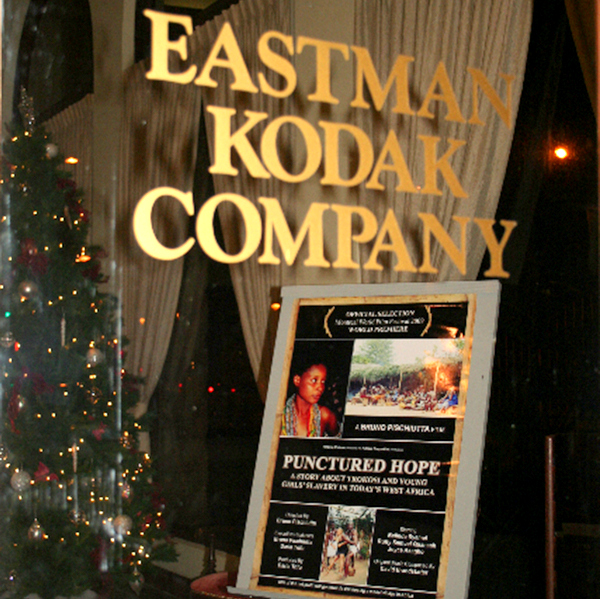
PUNCTURED HOPE screening at Eastman Kodak in LA.
This is a great aspect of filmmaking. Going to a place, risking sometimes your own life, for the only reason of bringing home the picture. This is culture, this is information. There is nothing funny about it.
TV Special by ‘Africa Journal’ and Thomson Reuters about “Punctured Hope”
Olga Matsyna: There are only few of your movies available for public viewing and this surprises me. Is there a reason?
Bruno Pischiutta: Yes, Olga. There is a reason and it may take a while to explain. Would you like another tea?
This is a very welcome pause since I now realise that we’ve been recording for close to two hours. I welcome his offer and we brake for a few minutes to watch Monica and Nerotto play on the beach.
Bruno Pischiutta: Oscar Wilde says: “The truth is rarely pure and never simple”. How right he is! This is something that many young filmmakers should learn. Let’s take an example: the University of Toronto has 90,000 students, no mystery right? It is a great centre of learning but it is not exactly this only. As a matter of fact 90,000 students have not only to study, but they also have to eat, dress and to live somewhere. There are, of course, a big number of businesses directly connected to the University and, due to the fact that these students are on holidays for big part of the summer, these businesses become seasonal businesses. Furthermore all these young students require a security system, they are not all so good and some of them can make mistakes and commit crimes…
This is just a way to show you how something that looks simple, such as a University, is not so simple when you dissect its different components.
The same happens in the film business.
A film can be a work of art, can be an important moment of social communication and many other things but, if it is a proper professional feature film, it always has a business side attached. Young filmmakers want to show their film as soon as possible, they want to see what people think but there are ways that are right and ways that are wrong to release a film. You can, for example, put every film on YouTube, everybody will see it, but the investors and the production company will not make a penny.
When you talk about professional filmmaking, you are also talking about a very important business. If you put a film on the internet, it will be stolen in one hour. If you release a film without the proper marketing operation, you will have a Box Office of $70 and the film, business-wise, will be finished forever.
A professional filmmaker has the obligation, toward his investors and the production company, to make out of a film a viable business vehicle, or this may be the last film he will ever shoot. So, in the same way in which it is a right or wrong time to make a certain movie, there is always a right or a wrong time to commercially release a certain movie.
A good movie is a financial treasure and you definitely don’t want to waste it’s release. If the moment is not right or if the marketing capital is not available, it is better to wait and maybe release the movie one year later and make a financial success out of it. Now, it is clear that, to release a movie, the relevant factors are many: the producer is not always in control of all of them so, he will do the right thing at the right time only.
In conclusion, you can say that many of my films are available right now. Some are simply not available to the viewers yet. Everything will be released at the right time.
Olga Matsyna: In film production you deal with big amounts of money. Are you intimidated by this factor? How do you approach this subject?
Bruno Pischiutta: The question is always “what are we doing?” We can build a little shack or we can build something that will be there for centuries like the Milan Dome that is, by the way, not finished yet. Of course, the little shack will have a very little cost but it will give to the investors a very little revenue and for a very short span of time. If, to the contrary, you build something majestic that will stay there for centuries, the investors will realise a great profit and that profit will extend and be on-going for a very long time.
Film is a misleading word; it can mean very many things. You can make a very small film or a great motion picture that all the world will watch for generations, as it happened for Gone With The Wind, Star Wars and many others. If you are aware of this, the amount of money necessary will not intimidate you.
Don’t get me wrong. I am still in favour of very contained budgets, but I also want budgets that don’t limit my artistic ability in a major way. The slate of films that my company intends to produce in the next few years requires about $200 million. This year alone, we are looking to invest $30 million. Are these amounts very big? It always depends on what you are doing and what your targets are. It is better to look for $200 million and create a value of $800 million, than to look for $120 million and create a value of only $200 million. This is because investors and production companies profit in percentage. Every one of our films has a very precise budget and projections and if it requires too much money for certain investors it may be that those investors are not the right ones.
Olga Matsyna: As an entrepreneur, how do you see the people who work for you?
Bruno Pischiutta: First of all, it is always my wish that my colleagues and my people are OK. I don’t believe that anybody is working for me, I believe that my colleagues and everybody involved in my business are just working with me. I can give you two examples: Toronto-based Producer Elio Dell’Unto who is with me from 27 years, and Producer Daria Trifu, President of my company, who is with me from 18 years. These two people have been with me all this time because they like what we do and they like how we do it. This is one of the first things that is in my mind when I do business.
Olga Matsyna: Do you express yourself creatively in any other ways?
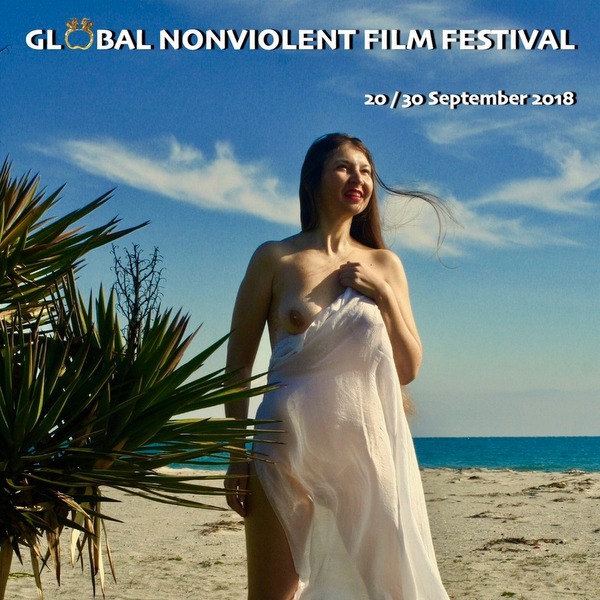
Olga Matsyna: Sometimes, I like to take important pictures. I took the pictures of most of the posters for the Global Nonviolent Film Festival in the last seven years, and I love to photograph, when possible, my actors. When I take pictures of actors, I like to showcase not only the shape of their bodies, but principally their souls.
Bruno Pischiutta: Another very important thing I do is to mentor certain young actors because I like to teach them every important thing they need to know before they enter the professional film business. I do a lot of other things: I am the Artistic Consultant of Global Nonviolent Film Festival and I watch and evaluate over 100 films every year and I take care of the administration of the four companies I am heading.
Olga Matsyna: Is there anything you would like to do that you have not done yet?
Bruno Pischiutta: Yes, I would like to write a book about what I think of today’s world. I am always ahead of time. I think that 1,000 years from now, people will look at our historical status and they will be very surprised: they will say “in 2018 they were still using money?” or “they still had several governments?”
I told you Olga, before starting the interview, not to ask me questions about politics or religion because I will simply not reveal what I am thinking. This is the reason why I am not writing this book; it would be very controversial and, some part of it, would probably be illegal.
Olga Matsyna: Did your life change in the years?
Bruno Pischiutta: Of course, same as I believe it changes for everybody else.
Some time ago, I said to a young girl that I was old and she, very kindly, told me “you are not old, you are antique”. Antique is precious. I feel very good because now I have nothing to prove, and my experience and culture gives me a lot of freedom. I am not comparing myself to younger people. This is the formula: I compare myself only to people of my age and I don’t feel that I am the worst around. This is because, probably, during my life, I did something right.
Olga Matsyna: Do you live in luxury?
Bruno Pischiutta: My only luxury is the possibility I have to choose the people I work with.
Olga Matsyna: Any special good or bad memories?
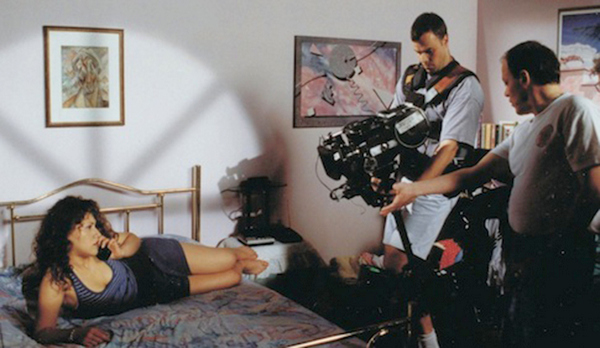
On the set filming MAYBE with actress Christina Macris in Toronto
Bruno Pischiutta: Sure. In all these years, I was a victim of crime few times. Ninety percent of the Box Office (180 million Italian Lire of that time) of my first movie was stolen in Rome by a friend of mine who was my employee. Later, in Los Angeles, 100% of the Box Office of my movie Maybe was stolen. I had 35 mm rolls of the most important scene of one of my films stolen only to be delivered years later (by ‘no name’) to my lab in Toronto. Attempted blackmail by people I trusted… and more. Many examples of bad memories.
These were bad things that, unfortunately, happen in our business frequently. I am, however, rich of good memories: every movie, every actor I worked with, many situations and learning experiences. They were all good and all worth it.
Olga Matsyna: Anybody in particular you love or you hate?
Bruno Pischiutta: I love most of the people I worked with. My best films are always a product of love. Hate, to the contrary, is a concept very far from me. I don’t hate anybody, I never did, because I never wanted to fill myself with negative energy. Some people are better and some people are worse. When I look at bad people, the first things that comes to my mind are all the reasons to excuse and forgive them for their wrongdoing.
Olga Matsyna: How is your life today?
Bruno Pischiutta: I am here, in Greece, at the moment. I go on the balcony of my office-residence very early in the morning, I look to my right toward East and I have the pleasure to see the sunrise on the Aegean Sea. In the afternoon, I look West ,and I have the pleasure to see the sunset on Mount Olympus. When I walk, my dogs accompany me and I am happy. I have my work and I feel very privileged with everything else.
Olga Matsyna: Where can everyone keep up with you to learn more?
Bruno Pischiutta: My company has decided to launch a personal website for me. It’ll be my first website. The condition was that I will have full control over it and, therefore, will publish what I choose. Maybe I’ll write my own blogs, and definitely I’ll be able to receive and reply to direct messages. I think this will be the right place to ‘keep-up’ with me, as you put it.
As we shake hands and leave, I look West and witness the sunset beginning to form on the edge of the Mount Olympus. He calls me, “Olga, you see?… that’s what I mean, true privilege”. I look at him, walking home followed by Monica and Nerotto, as I make my way to my hotel.
What I am left with, from this beautiful experience of coming in direct contact with one great personality of our world today, is that more I know, more I want to know. Above all, I feel that, the best is still to come
In Conversation with Michael Oblowitz Director of Confidential Informant
Confidential Informant stars Mel Gibson, Dominic Purcell, and Kate Bosworth

